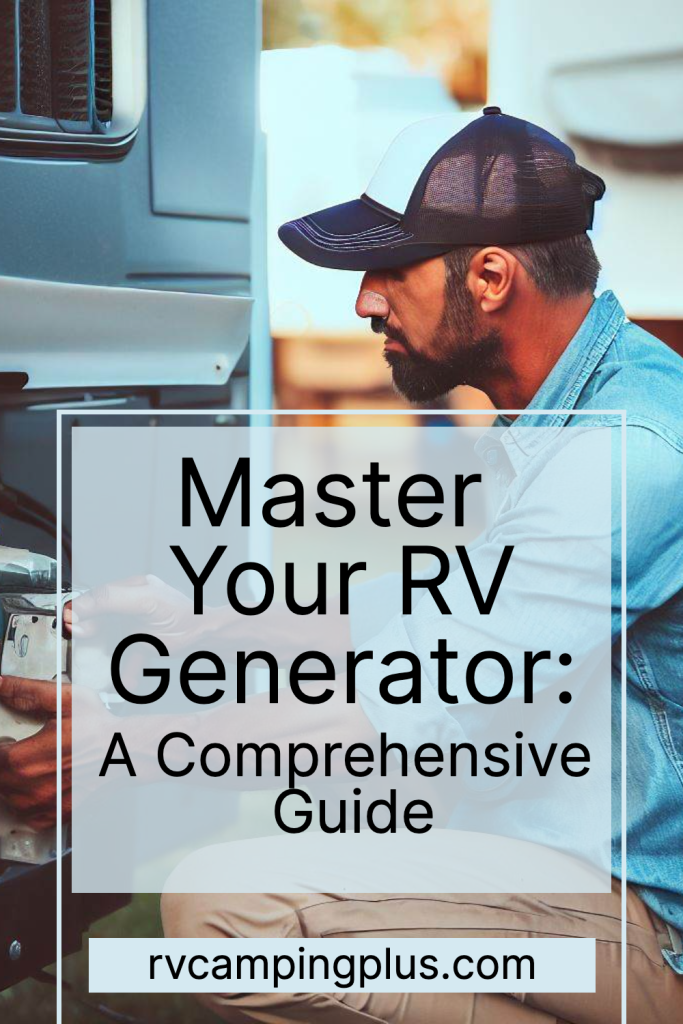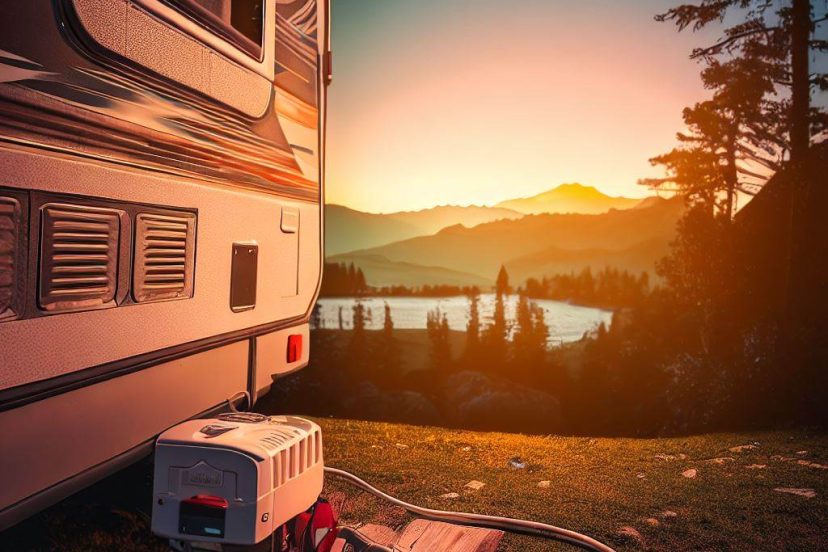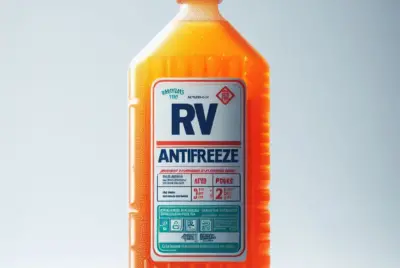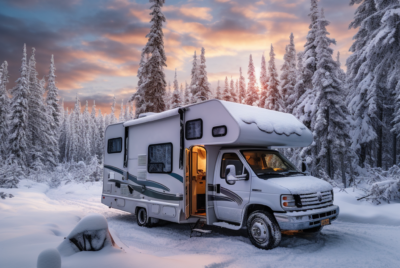The Ultimate Guide to RV Generators
One of the most essential parts of your camping experience is your RV generator. Understanding this critical equipment can significantly enhance your outdoor adventures, whether you’re an old hand at RV camping or a bright-eyed beginner. This comprehensive guide will delve into the different types of generators, how to choose the right size, their installation process, maintenance tips, fuel usage, noise reduction strategies, safety precautions, eco-friendly options, and troubleshooting if your generator won’t start. So buckle up, and let’s jump into this journey of empowering you with essential RV generator knowledge.
What is the Best Generator for an RV?
As an RV enthusiast, I’ve been in your shoes, wondering what’s the best RV generator to power all those conveniences we take camping with us. Here’s the inside scoop on some fantastic choices!
Honda EU3000iS: Dependable Powerhouse
First up, we’ve got the Honda EU3000iS. Honda’s generators, like their cars, are all about reliability. This model is a gem with 3000 watts of power, perfect for most medium-sized RVs. Have you ever had your computer crash due to an unstable power supply? Fear not! The EU3000iS uses advanced inverter technology that serves up stable, clean power that even your sensitive devices can safely feed on.
Yamaha EF2400iSHC: Compact Yet Mighty
The Yamaha EF2400iSHC is like a small dog with a big bark. It’s compact but packs a powerful punch. The standout feature? Its Smart Throttle adjusts engine speed to match the load, keeping the noise down and saving fuel. With Yamaha, you know you’re investing in long-lasting durability.
Champion’s Dual Fuel Versatility
Here’s a curveball for you – the Champion 3400-Watt Dual Fuel RV Ready Portable Inverter Generator. The name’s a mouthful, but it’s worth every syllable. Ever wish you could choose between propane and gasoline? This baby does both. Champion offers a unique combination of versatility, affordability, and quality. It’s a triple threat!
Cummins Onan QG 5500
This generator is designed specifically for large RVs, offering up to 5500 watts of power. It’s a trusted brand among RV owners and is known for its durability and reliability. It’s slightly noisier than some inverter generators, but for larger RVs requiring more power, it’s an excellent choice.
Generac 7117 GP2200i
This model provides 2200 watts of clean and stable power, making it ideal for small to medium-sized RVs. It’s lightweight and portable with a user-friendly design. Generac is known for its excellent customer service and dependable products.
Westinghouse iGen4500
This RV-ready generator provides 3700 running watts and up to 4500 peak watts. It’s equipped with a remote start and a digital display that shows fuel level, power output, remaining run time, and more. Westinghouse generators are known for their quality, performance, and innovative features.
DuroMax XP4400E
This powerful generator offers 4400 starting watts and 3500 running watts. It features an electric start for easy operation and is equipped with a large fuel tank for extended run times. DuroMax generators are recognized for their power output and versatility.
Choosing Your RV Generator
So, what is the best generator for an RV? The answer isn’t one-size-fits-all. It’s about finding the generator that suits your needs. Whether it’s the dependability of Honda, the compact power of Yamaha, or the fuel versatility of Champion, each has its unique charm. But let’s not forget other noteworthy mentions, such as the powerful DuroMax XP4400E, the innovative Westinghouse iGen4500, or the reliable Cummins Onan QG 5500.
Remember, your RV is your home away from home, and your RV generator is the heartbeat that powers it. Choose wisely, my fellow RV adventurers!
How Does an RV Generator Work?
Ah, the RV generator – the unsung hero of our RV travels. You know, the device that magically powers our campers, but how does it do it? Let’s dive into the fascinating world of RV generators!
The Heart of the Operation
Think of your RV generator as the heart of your camper. Just like a heart pumps blood throughout the body, your generator pumps electricity throughout your RV. It starts with the fuel source – either gasoline, diesel, or propane. The engine burns this fuel, which in turn drives the alternator. This is where the magic happens!
The Mighty Alternator
The alternator is the unsung hero within our hero. It’s essentially a magnet surrounded by wire coils, and as it spins, it creates an electric field – voila, electricity! But here’s the catch: this raw electricity is AC (Alternating Current), and it’s not smooth and steady. It’s more like a rollercoaster – not great for our sensitive devices. How do we solve this?
Smooth Sailing with Inverter Generators
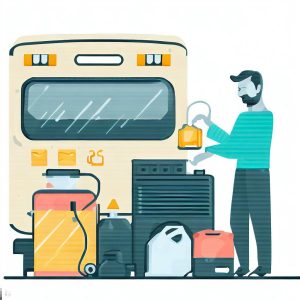 Enter the inverter generator. Here’s where things get techy. An inverter generator takes the raw AC power, converts it to DC (Direct Current), then “inverts” it back to AC. Sounds like a roundabout way of doing things, right? But this process creates a smooth, stable stream of AC power – think more like a lazy river than a rollercoaster. It’s perfect for our delicate electronics like laptops and televisions. Keep in mind this is different than your RV power inverter.
Enter the inverter generator. Here’s where things get techy. An inverter generator takes the raw AC power, converts it to DC (Direct Current), then “inverts” it back to AC. Sounds like a roundabout way of doing things, right? But this process creates a smooth, stable stream of AC power – think more like a lazy river than a rollercoaster. It’s perfect for our delicate electronics like laptops and televisions. Keep in mind this is different than your RV power inverter.
So there you have it! The behind-the-scenes tour of your RV generator. From the combustion of fuel to the spinning alternator, right through to the inverting process for a smooth power supply. It’s not just a box that creates electricity – it’s a marvel of engineering that enables us to enjoy the comforts of home wherever our adventurous hearts take us. So next time you flick on that light switch in your RV, give a thought to the generator humming away outside. It’s working hard for your comfort!
What Types of RV Generators are Available to Purchase?
Let me tell you, picking an RV generator can be as thrilling as selecting a new camper. The variety can be mind-boggling but fear not; I’m here to guide you through this electrical maze!
Gasoline Generators: The Popular Choice
When it comes to availability, gasoline generators often take the lead. They’re easy to find, relatively inexpensive, and the fuel is widely available. But remember, they have a shorter lifespan and higher maintenance needs than other types. A worthy choice if you’re on a budget but expect some upkeep!
Propane Generators for RVs: The Long-Lasting Comrade
A propane generator for RV camping is like that dependable friend who’s always got your back. They boast a longer lifespan and run cleaner than their gasoline counterparts. And a bonus? Propane can be stored indefinitely – a handy feature for those infrequent users. However, they’re not as efficient, and the fuel can be more costly.
Diesel Generators: The Heavy-Duty Champ
Diesel generators, on the other hand, are the strong, silent types. They run efficiently, require less maintenance, and deliver more power. But be warned – they’re pricier, and the noise levels can be higher. A top-notch choice for those larger campers that require serious juice!
Inverter Generators: The Technological Marvel
The crowning glory in our generator family is the inverter generator. These wonders take raw power, smooth it out, and deliver clean, stable electricity – perfect for sensitive devices. They’re quiet, efficient, and lightweight, though more expensive. It’s like upgrading from a bike to a sports car – you pay more, but oh, the benefits!
Finding Your Perfect RV Generator
Choosing an RV generator is about balancing power needs, cost, and convenience. Be it the budget-friendly gasoline generator, the long-lasting propane type, the robust diesel one, or the technologically advanced inverter generator, each has its unique allure. So, my fellow adventurers, take your pick, power up, and let the camping begin!
How Big of a Generator Do I Need for My RV?
Choosing the right size RV generator is much like picking the perfect pair of shoes. You don’t want it too small to be useful or too large to be practical. So, how do you find that perfect fit? Let’s walk you through it!
Power Needs: Your Starting Point
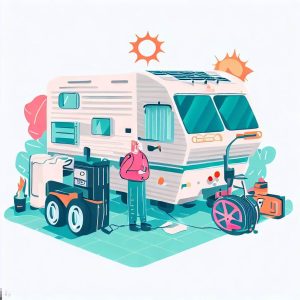 Determining your power needs is the first step. Make a list of all the appliances you’ll be using in your RV. Everything from your air conditioner and fridge to your coffee maker and hairdryer. Each device has a specific wattage requirement, and together they form your total power needs. Remember, it’s always better to have a bit more power than you think you might need – it’s like buying shoes with some wiggle room!
Determining your power needs is the first step. Make a list of all the appliances you’ll be using in your RV. Everything from your air conditioner and fridge to your coffee maker and hairdryer. Each device has a specific wattage requirement, and together they form your total power needs. Remember, it’s always better to have a bit more power than you think you might need – it’s like buying shoes with some wiggle room!
When it comes to RV generators, most are rated in watts, but the equivalent amperage can also be used to describe their output. A generator’s output is typically given in kVA or kilovolt-amperes, which can be converted to watts or amps. Here are five common types, their wattage, and approximate ampere rating:
- 2000-Watt Generator: This type of generator is often used for small RVs or campervans. It provides around 16.6 amps at 120 volts, enough to power smaller appliances like a microwave or a TV.
- 3000-Watt Generator: Offering roughly 25 amps at 120 volts, a 3000-watt generator can typically handle the electrical needs of a medium-sized RV, including the air conditioning unit.
- 4000-Watt Generator: Providing about 33.3 amps at 120 volts, these generators are suitable for larger RVs. They can support multiple appliances simultaneously, including an air conditioning unit, refrigerator, and small appliances.
- 5500-Watt Generator: This type delivers roughly 45.8 amps at 120 volts. It’s often found on larger, luxury RVs and can handle nearly all the electrical needs of the RV.
- 7000-Watt Generator: The largest common category, these generators offer around 58.3 amps at 120 volts. They’re typically used in large, luxury RVs and can handle multiple large appliances at once, including two air conditioning units.
So, if you think you need a 50 amp RV Generator then you probably should bump up to the 7000-Watt generator. But, if you need a 30 amp RV Generator then you might want to get either the 4000 Watt or perhaps the 5500 Watt to give you a little room to grow.
Remember, the actual output and the number of appliances you can power depend on the specific models of both the generator and the appliances, as well as on whether you’re running them simultaneously. Always refer to the manufacturer’s guidelines for the most accurate information.
Starting vs. Running Watts: The Unsung Difference
Most appliances have two power ratings – starting watts and running watts. Starting watts are the initial surge of power needed to start an appliance, usually higher than the running watts required to keep it running. It’s like sprinting the first 100 meters of a marathon and then settling into a steady pace. Your generator needs to handle both!
Size Does Matter: Choosing the Right RV Generator
Once you’ve calculated your power needs, you can start shopping for your generator. For smaller RVs or minimal power needs, a generator of around 2000 watts may suffice. Got a medium-sized RV with standard appliances? Look for something around 3000-4000 watts. Rolling in a large RV with high-power appliances? You might need an RV generator that provides 6000 watts or more. Remember, it’s not just about physical size but the power output!
Finding Your Perfect Fit
Choosing the right size RV generator is like a balancing act between your power needs and the generator’s capabilities. The key is understanding your requirements and matching them with the right generator. So, take stock, crunch those numbers, and embark on your quest to find the perfect generator for your RV – your magical power supply awaits!
How Do I Maintain My RV Generator?
Maintaining your RV generator is like tending a garden. It needs consistent care, checks, and attention to ensure it stays healthy and runs smoothly. So, what are the best ways to keep your generator in top shape? Let’s find out!
Regular Exercise: Keeping It Running
Think of your RV generator as an athlete – it needs regular exercise to stay fit. Running your generator under load for at least two hours each month helps keep the components lubricated and removes any moisture build-up. It’s like taking it for a jog to keep it in top shape!
Check and Change the Oil: The Lifeline
Oil is to your generator what water is to a plant. Regularly check your oil levels and change the oil as recommended by the manufacturer – usually after a specific number of operating hours. Clean oil ensures your generator runs smoothly, just like watering keeps your plants vibrant!
Inspect and Replace Filters: The Breathers
Your generator’s air and fuel filters are its lungs. Keep them clean, and your generator will run smoothly. Inspect them regularly and replace them as needed. It’s like ensuring your garden has fresh air and the right nutrients for healthy growth!
Mind the Spark Plugs: The Spark of Life
Spark plugs are the heartbeat of your RV generator. Regularly inspect them for wear and tear and replace them if needed. A well-maintained spark plug ensures your generator runs efficiently, much like a healthy heart keeps you active!
Your RV Generator’s Health Is in Your Hands
The key to maintaining your RV generator is regular checks, timely replacements, and good care. Keep it running, mind the oil, take care of the filters, and don’t forget the spark plugs. Remember, a well-maintained generator ensures you a worry-free RV adventure. So, keep your generator happy, and it will return the favor tenfold on your travels!
How Much Fuel Does an RV Generator Use?
Just like how you monitor your car’s fuel consumption, knowing the fuel usage of your RV generator can help you plan trips better. But how much fuel does it really use? Let’s break it down!
Fuel Consumption: The Basic Equation
Let’s begin with the basics. An RV generator’s fuel consumption is directly tied to its power output and load. A bigger, more powerful generator running at full capacity will use more fuel than a smaller one running light. It’s like how a sprinter burns more calories than a casual jogger!
Gasoline Generators: The Thirsty Ones
Gasoline generators tend to be thirstier compared to their diesel and propane counterparts. A typical model running full load can consume around half to one gallon of fuel per hour. Remember, gasoline may be more accessible, but it burns quickly!
Diesel Generators: The Power Sippers
Diesel generators are more fuel-efficient. A similar-sized generator can run for longer on a gallon of diesel than gasoline. So if fuel efficiency is your game, diesel may be your name!
Propane Generators: The Clean Burners
Propane generators are the environmentalists of the generator world. They burn clean and are more efficient than gasoline, but not as much as diesel. You can expect a 20lb propane cylinder to last about 4-5 hours at full load.
Monitoring Your RV Generator Fuel Consumption
Understanding your RV generator’s fuel consumption helps in planning fuel stops and managing your resources efficiently. Whether it’s gasoline, diesel, or propane, the key is to remember that usage depends on load and power output. So, fuel up, start that generator, and enjoy the comfort it brings to your RV adventures – just remember to keep an eye on the gauge!
How Can I Reduce the Noise of My RV Generator?
Isn’t it annoying when you’re trying to enjoy the serene beauty of nature, and all you can hear is your RV generator humming away? It’s like trying to listen to a soft melody over a blaring horn. So, how do you minimize that noise and get back to enjoying the tranquillity? Let’s dive in!
Using a Sound Enclosure: The Noise Barrier
A sound enclosure around your RV generator can be as effective as a noise-canceling headphone. These enclosures or boxes are made with sound-absorbing materials that mute the noise, giving you the peace you crave. But remember, generators need to breathe, so ensure the enclosure has enough ventilation!
Proper Generator Placement: Distance Matters
Placing your generator farther from your camping area can significantly reduce the noise level. It’s similar to standing near a loudspeaker at a concert – the farther you move away, the lower the noise. Remember to place it in a spot where it won’t disturb others!
Using Anti-Vibration Mounts: The Shaking Solution
Your RV generator doesn’t just make noise; it vibrates too, which can amplify the sound. Anti-vibration mounts can dampen these vibrations and, in turn, reduce noise. They’re like shock absorbers on your car, smoothing out the ride!
Routine Maintenance: The Preventive Measure
Regular maintenance is also crucial for reducing generator noise. Keeping your generator in good shape means it’ll run smoother and quieter. Just like a well-tuned guitar produces sweet music, a well-maintained generator hums softly!
Enjoy a Quiet RV Generator Experience
Reducing your RV generator’s noise is all about proper placement, sound enclosures, anti-vibration mounts, and regular maintenance. Incorporate these methods, and you’ll be enjoying your camping trips in peaceful bliss with a quiet RV generator before you know it. After all, we go camping to connect with nature, not to listen to our generators, right?
How Is an RV Generator Installed?
Just bought a new RV generator and wondering how to get it installed? Picture it like setting up a new game console – it might be a little tricky at first, but once you know the steps, it’s all pretty straightforward. So, let’s dive right in!
Step 1: Choosing the Right Spot: The Base Camp
The first step to installing your RV generator is deciding where it will live. This choice is like finding the perfect campsite – it has to be safe, secure and well-ventilated. Also, keep in mind that it should be easily accessible for routine maintenance!
Step 2: Preparing the Mount: The Foundation
Once you have chosen the right spot, the next step is to prepare the mount or the foundation for your generator. It’s like setting up your tent on a camping trip. You need a sturdy, level base to ensure everything runs smoothly! This can be just a flat compacted dirt surface or a concrete pad.
Step 3: Securing the Generator: The Safety Measure
Next, you’ll place your generator on the prepared mount and secure it firmly. Some heavy-duty stakes work well for this. Think of it as tying down your canoe on a windy day; you wouldn’t want it to go wandering off, would you?
Step 4: Connecting the Fuel Source: The Lifeline
After securing the generator, it’s time to connect the fuel source. This step is like attaching a water hose to your RV – it keeps things running. Make sure you follow the manufacturer’s instructions to avoid any potential leaks!
Conclusion: You’ve Set up Your RV Generator!
So, there you have it – installing your RV generator isn’t as intimidating as it first seems. Once you’ve got it secured in the right spot, connected to the fuel source, and ready to go, you’ll be back to enjoying your RV adventures in no time. Just remember, if you’re ever unsure, it’s best to reach out to a professional. Happy camping!
What are the Safety Precautions to Take While Using an RV Generator?
Safety is a big deal, especially when you’re dealing with powerful equipment like an RV generator. It’s like respecting the rules of the great outdoors when you’re camping – vital to ensure everyone has a good time! So, let’s cover the essential safety precautions you should take when using an RV generator.
Proper Ventilation: Let it Breathe
Firstly, just like how we wouldn’t set up camp in a closed cave, it’s essential that your RV generator is always operated in a well-ventilated area. This ensures harmful exhaust gases, like carbon monoxide, are properly dispersed and not inhaled.
Regular Maintenance: The Routine Check-up
Regular maintenance of your RV generator is like keeping your camping gear in top shape. It’s crucial for safety! Inspect your generator regularly and ensure it’s running smoothly. That includes checking oil levels, cleaning air filters, and keeping an eye out for any strange noises or behaviors.
Safe Refuelling: Patience is Key
Refueling your generator can be compared to cooking over an open fire – timing is everything! Just like you wouldn’t add logs to a roaring flame, don’t refuel your generator while it’s running or hot. Wait until it cools down to avoid any potential accidents.
Proper Wiring: Keeping it Together
Ensure the wiring of your RV generator is up to par, like checking your hiking boots’ laces before a long walk. Faulty or frayed wires can lead to accidents, so regular inspections are essential!
Safety Comes First!
Just like the wilderness, your RV generator deserves respect and proper care. By following these safety precautions, you ensure a safer and more enjoyable RV experience. So, let’s all stay safe out there and happy camping!
Are there any Environmentally Friendly RV Generator Options?
As a lover of the great outdoors, I’m always on the lookout for ways to reduce my footprint. Just like choosing a trail that has the least impact on nature, I wondered, “Are there any environmentally friendly options for an RV generator?” To my delight, the answer is yes!
Solar Generators: Harness the Power of the Sun
Solar generators, akin to a sunflower turning towards sunlight, utilize solar panels to capture the sun’s energy and convert it into electricity. This RV generator option doesn’t emit any harmful pollutants and uses an abundant, renewable energy source – the sun! Isn’t it amazing that we can camp under the stars, powered by the sun?
Inverter Generators: Efficiency is Key
Inverter generators, like a wise owl utilizing its energy efficiently at night, adjust their engine speed to match the power demand. This functionality not only reduces fuel consumption but also minimizes exhaust emissions, making them a more environmentally friendly option compared to conventional generators.
Hybrid Generators: The Best of Both Worlds
Imagine combining the convenience of a multi-tool with the simplicity of a pocket knife. That’s the beauty of a hybrid generator. These RV generators can operate on multiple fuel types, giving you the flexibility to choose a more environmentally friendly fuel when available.
A Greener RV Experience
Being a responsible steward of the environment doesn’t mean giving up the comfort of an RV adventure. With these environmentally friendly RV generator options, you can continue to enjoy the beauty of nature, knowing you’re doing your part to preserve it. After all, our love for RV camping comes from our love for the outdoors, doesn’t it?
What Do I Do If My RV Generator Won’t Start?
We’ve all been there. You’re in the middle of nowhere, the stars are just starting to twinkle, and your trusty RV generator decides it’s on vacation. Suddenly, it won’t start. Panic sets in, but hey, let’s keep our cool. Here are a few troubleshooting steps that may bring your stubborn RV generator back to life.
Step 1: Check the Basics
Just like when you lose something and find it in the last place you look, sometimes, it’s the simplest thing we overlook. Is there enough fuel? Is the oil level correct? Are the air filter and spark plug clean? A quick examination can often solve the problem.
Step 2: Investigate the Fuel System
This one’s a bit like a detective following the clues. If there’s fuel in the tank, but your RV generator won’t start, there might be an issue with the fuel lines or the carburetor. In such cases, a good cleaning or replacement might be the solution.
Step 3: Take a Look at the Electrical System
If you’ve ever tried to charge your phone only to realize the outlet’s not working, you know the importance of checking your power source. For an RV generator, it means ensuring all switches and connections are functioning correctly, and the battery is charged.
If in Doubt, Call a Professional
If your RV generator is still playing hide-and-seek with its power, it may be time to call a professional. Just like a reliable road trip buddy, a good mechanic can help get you back on track. Remember, RV camping is an adventure, and sometimes, solving a tricky RV generator issue is part of the journey.
Empowering Your RV Adventure With Generator Knowledge
In the vast world of RV camping, the RV generator is a cornerstone. From selecting the perfect one to keeping it in top condition, your generator plays a crucial role in ensuring a seamless and enjoyable camping experience. With this comprehensive guide in your hands, you are now equipped to make informed decisions, troubleshoot issues, and ensure safety when dealing with your RV generator. The road may be long, but with your trusty generator humming in the background, providing power, comfort, and peace of mind, your adventure is bound to be a memorable one. So here’s to open roads, starry nights, and the reassuring hum of your RV generator – Happy RVing!
FAQs
Q: Can I run my RV generator while driving?
A: Yes, it is generally safe to run your RV generator while driving, as long as it’s properly secured and maintained. It can help power your RV’s air conditioning, refrigerator, and other appliances.
Q: How often should I run my RV generator when not in use?
A: To keep your RV generator in good condition, it’s recommended to run it for about two hours every month at about half-load. This helps lubricate the engine and prevent build-up in the carburetor.
Q: Can I use a regular generator for my RV?
A: Yes, you can use a regular portable generator for your RV. However, RV generators are specifically designed to withstand the rigors of road vibration and are often quieter, making them a better choice for most campers.
Q: How long does an RV generator last?
A: The lifespan of an RV generator varies depending on its make, model, and how well it’s maintained. But with proper care, many RV generators can last for over 2,000 to 3,000 hours of operation.
Q: Do RV generators charge the battery?
A: Yes, RV generators can charge the RV’s batteries while they’re running. This can be especially useful for maintaining battery life during periods of heavy appliance use or when there’s no other power source available.
